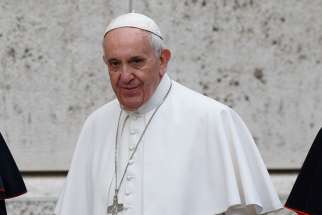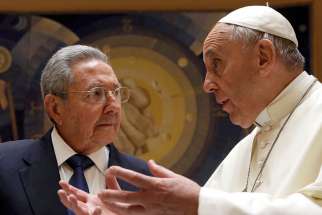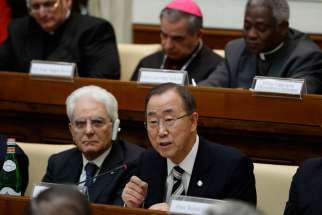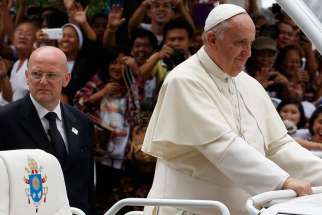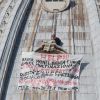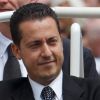Surprise! Pope Francis stops by Vatican’s new homeless shelter
VATICAN CITY - Pope Francis has made a surprise visit to a new homeless shelter just outside Vatican City, the pontiff’s latest move to draw attention to the world’s poor.
VATICAN CITY - After spending close to an hour with Pope Francis, Cuban President Raul Castro told reporters he is so impressed by what the Pope does and says that he might start praying and could even return to the church.
Top officials from the Vatican, the head of the United Nations and leading scientists came together at a summit Tuesday (April 28) in Vatican City to label the fight against man-made climate change as a “moral issue.”
VATICAN CITY - The head of Vatican security said Islamic State militants have threatened the Vatican, but there are no indications of any planned attack.
VATICAN CITY - A 49-year-old Italian man protesting the economic policies of Italy and Europe scaled a fence on top of the dome of St. Peter's Basilica Oct. 2 and remained perched above a window for 28 hours, even during Pope Benedict XVI's weekly general audience in the square below.
With the help of two Vatican firefighters and the rope he had tied around himself, the protester, Marcello Di Finizio, climbed back up to the public walkway on top of the dome about 8 p.m. local time. He was escorted to a nearby Italian police station for what he told The Associated Press were "formalities."
Pope Benedict did not mention the protester, Marcello Di Finizio, during his audience talk.
Di Finizio, who had scaled the fence on the dome in July as well, runs a beachfront business in northern Italy, renting umbrellas and chaise lounges. He has been protesting Italy's plan to obey European Union directives by holding public auctions to distribute licenses to operate such businesses on public beaches.
Shortly after the Pope's general audience ended, Catholic News Service reached Di Finizio on his cellphone. Speaking from the dome, he told CNS: "I'm here to ask for help. Our government, our state, doesn't exist. Sectors of the economy, the beach sector, have been paralysed for years by government policies.
"I ask for political asylum from the Vatican," he said. "The Pope is the highest ethical and moral authority in this country, or at least he should be — let's hope he still is."
Di Finizio, who was wearing an Italian flag around his neck, said he would not come down until government officials and labour union officials promised to sit down with him and resolve the serious economic issues facing Italians who work in the tourism sector.
The protester said he felt forced to take his protest public in a highly visible fashion.
"I want to live; I like living," he said, but "if they want to kill me, let them do it in front of millions of people."
Di Finizio implied he could be willing to jump from the dome. When others are driven to such desperate measures, he said, "these are not suicides, these are homicides."
When a CNS reporter suggested that his message had been heard and he could come down, Di Finizio laughed and said: "In your country, maybe that would work, but we're in Italy. Here they will slap me on the back, kick me in the rear and not listen any more."
Then Di Finizio made a request, "Please ask the Pope to send up an electrical cable so that my phone battery doesn't go dead and I can keep talking to (all of) you."
Jesuit Father Federico Lombardi, Vatican spokesman, said Di Finizio obviously was not mentally stable.
Vatican firefighters and police officers remained on the public walkway around the top of St. Peter's dome throughout the night and into Oct. 3 as Di Finizio's protest continued.
Di Finizio had joined a group of tourists going to the top of St. Peter's Basilica at about 5 p.m. Rome time Oct. 2. Security cameras showed him climbing over the 1.5-metre-high fence, tying a rope around himself and lowering himself down to a large decorative overhang above one of the dome's windows. He also managed to unfurl and tie down a large banner to the dome that said "Help!" and called for an end to policies that were "butchering society."
Vatican investigates conditions of butler's detention
VATICAN CITY - Paolo Gabriele, the papal butler on trial in the Vatican, told judges that for 20 days he was held in a tiny cell where he could not even fully extend both arms and where Vatican police kept the lights on 24 hours a day.
Gabriele's testimony about the conditions of his detention after his arrest in May came in response to questions posed by his lawyer Oct. 2, the second day of his trial on charges of aggravated theft for allegedly stealing reserved papal correspondence and leaking it to a reporter.
After the testimony, Jesuit Father Federico Lombardi, Vatican spokesman, said the Vatican court had ordered an investigation into the claims.
The Gendarme Corps of Vatican City State, as the Vatican police force is formally known, issued a statement saying that Gabriele was held in a small cell for 20 days while previously scheduled remodeling work was sped up and completed on a larger room for prisoners. The police said the work included improvements "responding to the requirements requested by the Convention Against Torture," a 1984 international agreement, which the Vatican signed.
As for the lights being left on, the police said the decision was made that it was a necessary precaution to ensure that Gabriele did not hurt himself. The statement added, however, that Gabriele was given a sleep mask.
Gabriele's Vatican physician made regular visits, the statement said, adding that Gabriele even told the doctor that he was "resting peacefully" and, in fact, was not as nervous as he had been before his arrest.
Complete meals were delivered to him three times a day, and he ate them in the company of police officers. He was taken outside each day and offered use of the police gym, although he declined that offer. Each day included "moments of relaxation and socialization with personnel from the Gendarme Corps with whom, for obvious reasons," he previously enjoyed a friendship. The officers, like Gabriele, worked together in the Vatican and accompanied the Pope at audiences and on trips.
The police also said Gabriele had "constant contact" with his spiritual advisors; he was escorted to Mass with his family and was able to visit with his family or meet with his lawyers almost any time he wanted.
The police statement said that if the Vatican investigation into the treatment of Gabriele demonstrates that his accusations are unfounded, the police would consider suing him.


